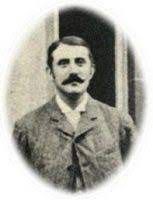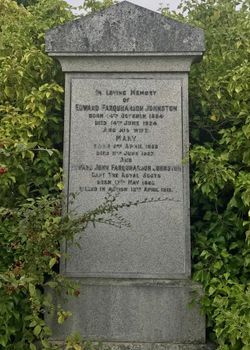Edward Farquharson Johnston

In Spain football refereeing began quite simply with weaving wool and shipping: ores and oranges. A family connection through his maternal grandmother to the McAndrews shipping-line had first taken Edward Farquharson Johnston there, specifically to Seville in the 1870s, his family being the Johnstons, then and now the originally Newmill-based, Elgin wool-weaver. But once in the Andalucian capital he became so much more - the rowing, shooting Vice-Consul, a pillar of a surprising large British cum Scots community, which was involved not just in the wine trade, notably sherry, but had wider interests in agriculture more generally, the revitalised mining industry and manufacturing.
Born in 1854 in Lhanbryde by Elgin and schooled in Scotland and England, in 1890 he was thirty-five, when at what was said to have been well-lubricated meeting it was decided to form a football club and he was elected its President.
Now, a great deal has been written about the origins of the present Sevilla Futbol Club. The claim is that its foundation date was that of the meeting. Frankly it seems fictional. That club was founded in 1905. This club was even in Spanish Club de Football de Sevilla. What is, however, true is that almost immediately an invitation to a match was issued to Recreativo de Huelva, a club founded again mainly by Scots at the end of the previous year and in the port city of the same name, sixty miles to the west. That match took place just across the river from Seville on La Tablada on 8th March 1890, the local club won 2-0 and Farquharson Johnston, with some knowledge, real or assumed, of the game, was referee; the first referee of an officially recognised football encounter in all Spain.
Johnston would remain in Seville until his retirement in 1906. He had been married in 1879 in Aberdeen to Mary Crombie from the city. Together they had three boys, Spainish-born. The first, Geoffrey, died in childhood. The second, Edward, born 1882, was killed in The Great War in 1915 in Belgium, a captain in the Scots Guards, and the third, James, born 1884, joined his father in business, which had made the family immensely wealthy. When Edward Snr. died in 1924 aged 69 he was living in The Boltons, West Brompton, London, leaving £120,000. He was then cremated in Golders Green but North London may not have been his ashes last resting place. In Elgin Old Cemetery there is a memorial to him, his wife, who died in 1927 at the same Boltons address, and to their late, middle son.

Birth Locator:
or
Residence Locator(s):
1871 - Church End Chemists College, Finchley, London
1911 - Hook Heath House, Hook Heath, Woking
1920 - 11, The Boltons, West Brompton, London
1924 - 11, The Boltons, West Brompton, London
Grave Locator:
Elgin Old Cemetery, Elgin, Moray
Game Locator
(Calle Sanz), La Tablada, Seville, Spain
Back to the Spanish Trail
or the SFHG Home page